|
|
|
Sort Order |
|
|
|
Items / Page
|
|
|
|
|
|
|
| Srl | Item |
| 1 |
ID:
167070


|
|
|
|
|
| Summary/Abstract |
In recent decades, China has transformed from a relatively egalitarian society to a highly unequal one. What are the implications of high levels of inequality for the lives of children? Drawing on two nationally representative datasets, the China Family Panel Studies and the China Education Panel Survey, we develop a comprehensive portrait of childhood inequality in post-reform China. Analyses reveal stark disparities between children from different socio-economic backgrounds in family environments and in welfare outcomes, including physical health, psychosocial health and educational performance. We argue that childhood inequality in China is driven not only by the deprivations of poverty but also by the advantages of affluence, as high socio-economic status children diverge from their middle and low socio-economic status counterparts on various family environment and child welfare measures.
|
|
|
|
|
|
|
|
|
|
|
|
|
|
|
|
| 2 |
ID:
167065
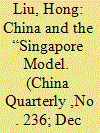

|
|
|
|
|
| Summary/Abstract |
Over the past three decades, China has shown tremendous interest in the “Singapore model” through its sending of tens of thousands of cadres to Singapore for executive training and graduate education. Although this phenomenon has been studied, no attention has been drawn to the perspectives of those mid-level cadres who took part in the training and what those perspectives might imply. Utilizing a unique dataset of over 1,350 mid-level cadres graduating from the “Mayors’ Class” in Singapore from 1995 to 2016 and follow-up surveys and interviews, this article intends to fill this gap. We found that the most appealing characteristics of the “Singapore model” for these mid-level officials lay in practical governance lessons and their potential transferability rather than in ideologies. This finding challenges conventional wisdom that the most plausible rationale of China's learning from Singapore is political. We also examine Xi Jinping's view of Singapore and its relevance to China's latest national agendas in building a “learning nation” and strengthening the CCP's resilience through anti-corruption and intra-party regeneration. The conclusion places the China–Singapore case within the context of the changing trend of transnational knowledge transfer in the non-Western world.
|
|
|
|
|
|
|
|
|
|
|
|
|
|
|
|
| 3 |
ID:
167075
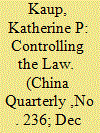

|
|
|
|
|
| Summary/Abstract |
Millions of China's ethnic minority citizens remain subject to competing legal standards, even as state officials strive to strengthen a unified notion of state law. Minority customary law continues to bind many minority citizens in both civil and criminal arenas and often conflicts directly with state law. What happens when these laws conflict? Based on fieldwork in Yunnan, this article shows how local officials and communities navigate legal pluralism and what legal and policy provisions guide them. Granting local judges discretionary authority to set aside state law in favour of customary law, although seemingly undermining law enforcement, may in the long run be the best path to strengthening rule of law in China's minority regions.
|
|
|
|
|
|
|
|
|
|
|
|
|
|
|
|
| 4 |
ID:
167063
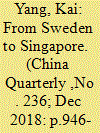

|
|
|
|
|
| Summary/Abstract |
China can be described as a “learning state” which has adapted to changing conditions and frequently turned outward for lessons. In recent years, Sweden and Singapore have drawn particularly strong interest from Chinese academics because the two countries represent two different “third ways” between Communism and capitalism and have been useful for developing a socialism “with Chinese characteristics.” Sweden is seen to symbolize the ideals of social equity and harmony while Singapore is seen as a model of authoritarian state-capitalism. China's transformation has resembled the Southeast Asia city state's model more than the Scandinavian social democratic model. Since Xi Jinping assumed power in 2012, interest in Sweden has reached a nadir, while attentiveness to Singapore has peaked. Although Chinese state-capitalism faces many challenges, including rising inequality and persistent corruption, it will be difficult to find an alternative role model that can successfully combine one-party rule with economic modernization.
|
|
|
|
|
|
|
|
|
|
|
|
|
|
|
|
| 5 |
ID:
167069
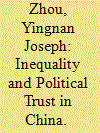

|
|
|
|
|
| Summary/Abstract |
The social volcano thesis states that the rising inequality in China threatens regime stability. This idea, although widely held in the media and in academia, is backed by little positive evidence but by much negative evidence. Two primary pieces of negative evidence are that the Chinese people trust the central government and that they are highly tolerant of inequality. This paper discusses the shortcomings of the negative evidence and re-examines the thesis in a rigorous and direct way. Our multilevel analysis shows that provincial inequality has negative effects on individuals’ trust in the local government but not in the central government, and this negative effect holds for both the rich and the poor. Because distrust in the local government implies distrust in the central government, we conclude that a social volcano exists.
|
|
|
|
|
|
|
|
|
|
|
|
|
|
|
|
| 6 |
ID:
167062
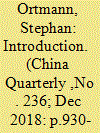

|
|
|
|
|
| Summary/Abstract |
This special section deals with China's longstanding fascination with Singapore's development experience that has preoccupied post-Maoist leaders from Deng Xiaoping to Xi Jinping despite the obvious differences between the tiny Southeast Asian city-state and the most populous country on earth. In particular, there is great Chinese interest in Singapore's success in combining effective governance and efficient state capitalism with stable one-party dominant rule. As a consequence, Chinese observers paid much less attention to electoral democracies that were well-governed states with mature economies.
|
|
|
|
|
|
|
|
|
|
|
|
|
|
|
|
| 7 |
ID:
167071


|
|
|
|
|
| Summary/Abstract |
Policy entrepreneurs play a pivotal role in policy changes in both electoral democracies and authoritarian systems. By investigating the case of healthcare reform in Sanming City, this article illustrates how the fragmented bureaucracy in China enables and constrains local policy entrepreneurs, and how entrepreneurial manoeuvring succeeds in realigning the old institutional structures while attacking the vested interests. Both structural conditions and individual attributes are of critical importance to the success of policy entrepreneurship. Four factors and their dynamic interactions are central to local policy entrepreneurship: behavioural traits, political capital, network position and institutional framework. This study furthers theoretical discussion on policy entrepreneurship by elucidating the fluidity of interactional patterns between agent and structure in authoritarian China. The malleability of rigid institutions can be considerably increased by the active manoeuvring of entrepreneurial agents.
|
|
|
|
|
|
|
|
|
|
|
|
|
|
|
|
| 8 |
ID:
167067


|
|
|
|
|
| Summary/Abstract |
Singapore exemplifies what China strives for: resilient authoritarianism despite advanced development with good governance and political stability. But lessons Chinese observers draw from the Southeast Asian city-state have been selective, leading to misconceptions. We focus on three key areas in which Chinese observers claim inspiration from the “Singapore model.” The first, Singapore's “Asian values” discourse which is seen to provide an ideological defense of non-democratic rule, overestimates the impact of top-down conservative culturalism while underestimating the difficulty of propagating Confucianism in officially still communist China. Second, while elections in Singapore are seen to bolster the ruling People Action Party's legitimacy in Singapore, they have been implemented to such a limited extent in China that any legitimation gain is unlikely. Finally, the chief lesson derived from Singapore's fight against corruption, the importance of a committed leadership, ignores the importance of the rule of law in Singapore, a legacy of colonialism very different from China's post-totalitarian trajectory.
|
|
|
|
|
|
|
|
|
|
|
|
|
|
|
|
| 9 |
ID:
167077


|
|
|
|
|
| Summary/Abstract |
Since the United States committed to withdraw from the UN Paris Agreement on climate change, international observers have increasingly asked if China can take the lead instead to raise global ambition in the context of a world leadership vacuum. Given the country's increasing economic and strategic focus on sustainable and low-carbon innovation, China might seem well placed to do so. However, much depends on the direction of governance and reform within China regarding the environment. To better understand how the government is seeking to make progress in these areas, this article explores key political narratives that have underpinned China's policies around sustainable development (kechixu fazhan) and innovation (chuangxin) within the context of broader narratives of reform. Drawing on theoretical insights from work that investigates the role of power in shaping narratives, knowledge and action around specific pathways to sustainability, this article explores the ways in which dominant policy narratives in China might drive particular forms of innovation for sustainability and potentially occlude or constrain others. In particular, we look at ecological civilization (shengtai wenming) as a slogan that has gradually evolved to become an official narrative and is likely to influence pathways to sustainability over the coming years.
|
|
|
|
|
|
|
|
|
|
|
|
|
|
|
|
| 10 |
ID:
167074
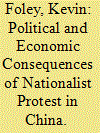

|
|
|
|
|
| Summary/Abstract |
What are the consequences of nationalist unrest? This paper utilizes two original datasets, which cover 377 city-level anti-Japanese protests during the 2012 Senkaku/Diaoyu Island crisis and the careers of municipal leaders, to analyse the downstream effects of nationalist unrest at the subnational level. We find both political and economic consequences of China's 2012 protest demonstrations against Japan. Specifically, top Party leaders in cities that saw relatively spontaneous, early protests were less likely to be promoted to higher office, a finding that is consistent with the widely held but rarely tested expectation that social instability is punished in the Chinese Communist Party's cadre evaluation system. We also see a negative effect of nationalist protest on foreign direct investment (FDI) growth at the city level. However, the lower promotion rates associated with relatively spontaneous protests appear to arise through political rather than economic channels. By taking into account data on social unrest in addition to economic performance, these results add to existing evidence that systematic evaluation of leaders’ performance plays a major role in the Chinese political system. These findings also illuminate the dilemma that local leaders face in managing popular nationalism amid shifting national priorities.
|
|
|
|
|
|
|
|
|
|
|
|
|
|
|
|
| 11 |
ID:
167064
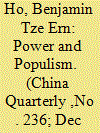

|
|
|
|
|
| Summary/Abstract |
Singapore's political system is sometimes criticized by proponents of liberal democracy as being highly authoritarian and inhibiting of individual freedom. Yet, as the recent 2015 general elections show, Singaporeans have largely consented to such a model as a legitimate social contract between themselves and the government. Given that the Singapore model is widely studied by Chinese officials as a positive pattern for governance, what do the latest results say about the future of the Chinese governing system, and to what extent is the Communist Party able to wield power while catering to populist sentiments, in particular the achievement of the Chinese dream?
|
|
|
|
|
|
|
|
|
|
|
|
|
|
|
|
| 12 |
ID:
167078
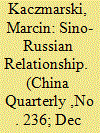

|
|
|
|
|
| Summary/Abstract |
A decade ago, Beijing's relations with Moscow were of marginal interest to China scholars. Topics such as growing Sino-American interdependence-cum-rivalry, engagement with East Asia or relations with the developing world overshadowed China's relationship with its northern neighbour. Scholars preoccupied with Russia's foreign policy did not pay much attention either, regarding the Kremlin's policy towards China as part and parcel of Russia's grand strategy directed towards the West. The main dividing line among those few who took a closer look ran between sceptics and alarmists. The former interpreted the post-Cold War rapprochement as superficial and envisioned an imminent clash of interests between the two states. The latter, a minority, saw the prospect of an anti-Western alliance.
|
|
|
|
|
|
|
|
|
|
|
|
|
|
|
|
| 13 |
ID:
167073
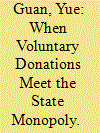

|
|
|
|
|
| Summary/Abstract |
China's blood-borne HIV catastrophe in the 1990s prompted the government to adopt a blood-collection system that combines voluntary donations with the state's monopoly on blood services. Juxtaposing fieldwork and survey data, this study examines how the intricate interplay between government manoeuvres and citizen reactions has led to blood shortages that are serious yet manageable. This article reveals that even though voluntary blood donations are adversely affected by a public distrust of state-run collection agencies, owing to political concerns healthcare officials shirk from engaging with citizens to overcome the distrust. It also finds that the blood shortages are nevertheless largely manageable because the authorities have the capacity to recruit captive donors through work units, with the caveat that such captive practices are used sparingly. Overall, this study argues that the lack of state–society synergy in voluntary donations, while exacerbated by government involvement, is also partially remedied by the government's mobilization of captive donors.
|
|
|
|
|
|
|
|
|
|
|
|
|
|
|
|
|
|
|
|
|